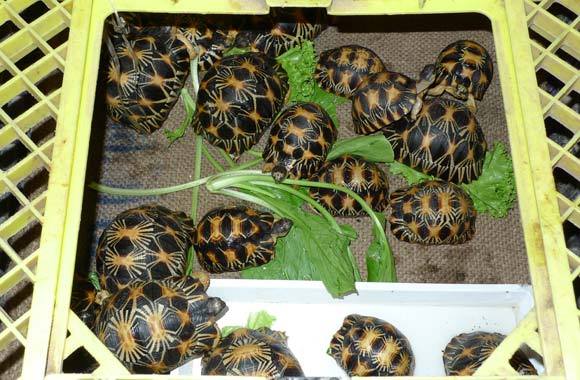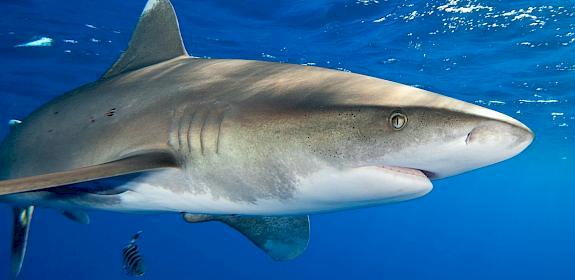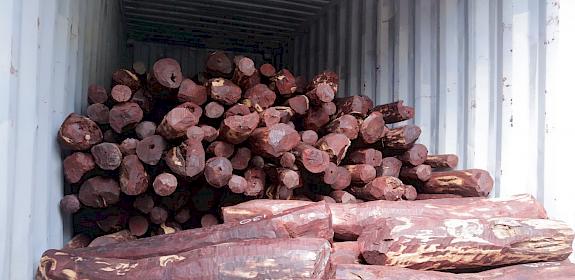Hundreds of protected tortoises seized in Madagascar
Antananarivo, Madagascar, October 2015—On 29th September, Malagasy Customs and border police officials scanning luggage discovered a staggering 771 wild native tortoises concealed in two wooden boxes at Antananarivo’s Ivato International Airport.

The seizure was described by Customs as the largest ever of its kind at the airport. The consignment included 8 Ploughshare Tortoises—considered to be the world’s rarest tortoise—and 763 Radiated Tortoises although 20 of the animals are understood to have died subsequently.
The surviving Radiated Tortoises have been handed over to the Turtle Survival Alliance and the Ploughshare Tortoises to the Durrell Conservation Trust for rehabilitation, before their release back into the wild.
Both Ploughshare and Radiated Tortoises are found only in Madagascar and both are classified by the IUCN Red List of Threatened Species as Critically Endangered, largely as a result of collection for the pet trade and habitat loss.
Jean Victor Ravony Tsaramonina, Head of the Air and Border Police told a media conference how the contents of the containers had been misdeclared and the tortoises hidden beneath diapers and other clothing items. The shipment was being sent as freight to Kuala Lumpur, Malaysia, via the island of Mauritius. He said investigations into the case were still underway.
“The authorities in Madagascar are to be warmly congratulated on this important seizure, which highlights the persistent threat to wildlife in Madagascar from illegal exploitation to meet the high demand from distant marketplaces,” said David Newton, TRAFFIC’s Regional Director for East and Southern Africa.
Malagasy reptiles are highly sought after by collectors, with high demand from Southeast Asia, especially from Indonesia, Malaysia and Thailand. The scale of the trade in Thailand was highlighted by TRAFFIC investigators in 2011, when a survey of 32 vendors in Bangkok and eight provinces found 591 specimens of Malagasy reptiles and amphibians available for sale.
In 2014, TRAFFIC highlighted the role of Bangkok as a hub for the illegal tortoise trade, many of the animals originating from South Asia and Madagascar.
Articles in the forthcoming issue of TRAFFIC’s flagship publication, the TRAFFIC Bulletin, will highlight Malaysia’s role in the international trafficking of Ploughshare Tortoises and Indian Star Tortoises. For example, in 2010, two Malagasy women became the first people charged and convicted under Malaysia’s International Trade in Endangered Species Act 2008 after they were found with 374 tortoises, the majority of them radiated tortoises in their possession. Each woman received a one year prison term.
Malaysia has made a number of similar seizures in the past, and this latest incident in Antananarivo indicates how the country continues to be a destination in the international smuggling of reptiles.
“TRAFFIC strongly encourages the Malagasy authorities to liaise with their counterparts in Malaysia and Mauritius to exchange as much information as possible on the international smuggling of Madagascar’s wildlife,” said Dr Chris R. Shepherd, Regional Director for TRAFFIC in Southeast Asia.
“The fact that tortoises from Madagascar are still readily available in the black market in Southeast Asia illustrates the need for greater collaborative enforcement efforts.”
The detection of this consignment during routine scanning processes also highlights the key role the transport industry sector can play in helping to stop wildlife smugglers.
Shortly before the seizure took place, TRAFFIC held a training workshop for Malagasy Customs officers under the auspices of the USAID funded SCAPES project on “Preserving Madagascar’s Natural Resources”, which aims to combat the illegal trade in Madagascar’s natural resources through capacity building for Malagasy stakeholders.The seizure was described by Customs as the largest ever of its kind at the airport. The consignment included 8 Ploughshare Tortoises—considered to be the world’s rarest tortoise—and 763 Radiated Tortoises although 20 of the animals are understood to have died subsequently.
The surviving Radiated Tortoises have been handed over to the Turtle Survival Alliance and the Ploughshare Tortoises to the Durrell Conservation Trust for rehabilitation, before their release back into the wild.
Both Ploughshare and Radiated Tortoises are found only in Madagascar and both are classified by the IUCN Red List of Threatened Species as Critically Endangered, largely as a result of collection for the pet trade and habitat loss.
Jean Victor Ravony Tsaramonina, Head of the Air and Border Police told a media conference how the contents of the containers had been misdeclared and the tortoises hidden beneath diapers and other clothing items. The shipment was being sent as freight to Kuala Lumpur, Malaysia, via the island of Mauritius. He said investigations into the case were still underway.
“The authorities in Madagascar are to be warmly congratulated on this important seizure, which highlights the persistent threat to wildlife in Madagascar from illegal exploitation to meet the high demand from distant marketplaces,” said David Newton, TRAFFIC’s Regional Director for East and Southern Africa.
Malagasy reptiles are highly sought after by collectors, with high demand from Southeast Asia, especially from Indonesia, Malaysia and Thailand. The scale of the trade in Thailand was highlighted by TRAFFIC investigators in 2011, when a survey of 32 vendors in Bangkok and eight provinces found 591 specimens of Malagasy reptiles and amphibians available for sale.
In 2014, TRAFFIC highlighted the role of Bangkok as a hub for the illegal tortoise trade, many of the animals originating from South Asia and Madagascar.
Articles in the forthcoming issue of TRAFFIC’s flagship publication, the TRAFFIC Bulletin, will highlight Malaysia’s role in the international trafficking of Ploughshare Tortoises and Indian Star Tortoises. For example, in 2010, two Malagasy women became the first people charged and convicted under Malaysia’s International Trade in Endangered Species Act 2008 after they were found with 374 tortoises, the majority of them radiated tortoises in their possession. Each woman received a one year prison term.
Malaysia has made a number of similar seizures in the past, and this latest incident in Antananarivo indicates how the country continues to be a destination in the international smuggling of reptiles.
“TRAFFIC strongly encourages the Malagasy authorities to liaise with their counterparts in Malaysia and Mauritius to exchange as much information as possible on the international smuggling of Madagascar’s wildlife,” said Dr Chris R. Shepherd, Regional Director for TRAFFIC in Southeast Asia.
“The fact that tortoises from Madagascar are still readily available in the black market in Southeast Asia illustrates the need for greater collaborative enforcement efforts.”
The detection of this consignment during routine scanning processes also highlights the key role the transport industry sector can play in helping to stop wildlife smugglers.
Shortly before the seizure took place, TRAFFIC held a training workshop for Malagasy Customs officers under the auspices of the USAID funded SCAPES project on “Preserving Madagascar’s Natural Resources”, which aims to combat the illegal trade in Madagascar’s natural resources through capacity building for Malagasy stakeholders.



